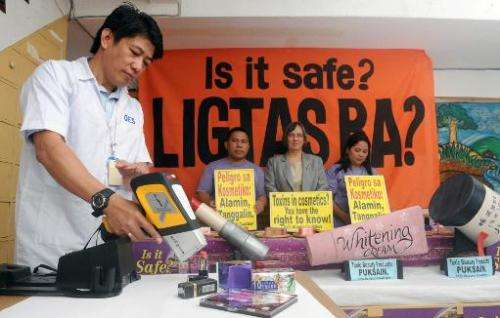Philippines bans lead after years-long campaign

The Philippines has banned the use of lead in a wide range of consumer products including toys and cosmetics, the government said Friday, after years of vocal campaigning by environmentalists.
"The chemical control order... (has) the intention of reducing unreasonable risks and injuries to people as a result of their exposure to the chemical as well as its negative impact on the environment," Environment Secretary Ramon Paje announced.
The ban covers a wide range of consumer products from toys and cosmetics to water pipes, school supplies and food and drinks packaging, he said in a statement.
Executives of import, manufacturing, distribution or recycling firms that violate the order face imprisonment of up to six months under the country's toxic substances law, the ministry said.
Environmental groups welcomed the ban, while urging it to ensure its strict enforcement.
"We are kind of late here. Many of our neighbours have already banned it," Abigail Aguilar, toxic substances campaigner for Greenpeace Southeast Asia, told AFP.
"The reason why it was (banned) is because of the noise that the civil society has created on the impact of lead."
The metal is used to make batteries, matches, metal alloys, paint, putty, ceramics, insecticides and explosives, among many others.
It is also used extensively in plumbing.
The widespread use of lead has caused extensive environmental contamination and health problems in many parts of the world, according to the World Health Organization.
The poison affects multiple organs and the health burden is borne mostly by developing countries, even as other countries have reduced its use in petrol, paint, plumbing and solder.
The Philippines earlier banned the use of lead in fuel in 2001.
But Aguilar, the Greenpeace campaigner, said the government has been unable to enforce a ban on other hazardous chemicals.
Between 1997 and 2004, the environment department issued similar chemical control orders on cyanide, asbestos and mercury, she said.
"The tricky part now is how to monitor this (lead ban) to make sure it will really be enforced," she added.
© 2014 AFP

















